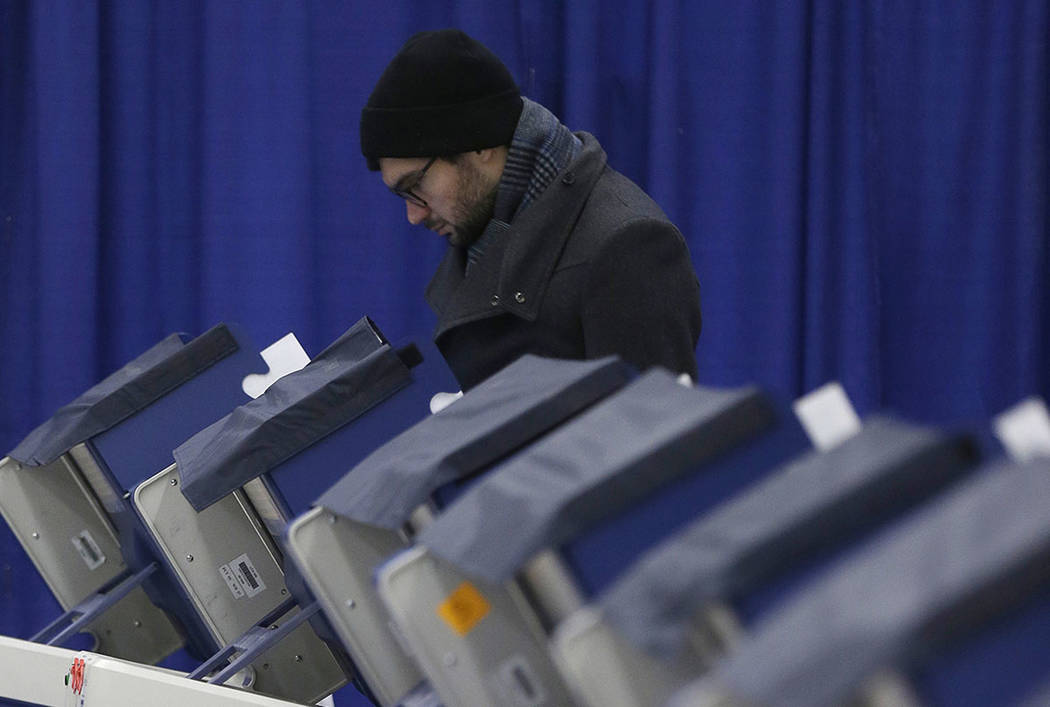Low turnout shows its time for a change
So it turns out that the 2019 municipal primary election didn’t see the worst turnout in the last 20 years.
It saw the second-worst.
So there’s that.
In 2005, just 7.65 percent of the more than 414,000 eligible voters cast a ballot in municipal races. This year, 8.8 percent of the 559,972 eligible voters did so. That’s fewer than 50,000 people.
This year marks the third time in the past 20 years turnout has not broken 10 percent. And the high-water mark in the past two decades was 22.3 percent.
But this election still produced some interesting results.
Former Rep. Ruben Kihuen — who didn’t seek re-election last year after facing credible accusations of sexual harassment from three different women dating to his time as a Nevada state senator — lost a bid for Las Vegas City Council by just five votes.
And Ward 3, where Kihuen came in third behind former Assemblywoman Olivia Diaz and Veterans Affairs project manager Melissa Clary, saw the lowest-turnout race in the entire city, with just 3,065 people casting ballots.
Who says one vote doesn’t matter?
Kihuen’s campaign said he would not seek a recount, which is the first responsible decision he’s made since the harassment scandal broke. It’s tempting to write him off, but this is Nevada. Another politician once lost a U.S. Senate race followed immediately by a losing bid for Las Vegas mayor. He was thought politically dead until a political appointment revived his career. Harry Reid went on to become the most powerful Nevadan ever to serve in Washington, D.C., and the man who helped give Kihuen his start in politics.
In other races, things were not close: Mayor Carolyn Goodman and two Henderson council incumbents, Dan Stewart and Dan Shaw, all achieved Saddam Hussein-like numbers in their respective bids, as did North Las Vegas incumbent Pamela Goynes-Brown.
An attempted mayoral coup in North Las Vegas fell flat: Incumbent Richard Cherchio will face a runoff election, but not against Mayor John Lee’s preferred candidate. Two years ago, Lee was able to oust a council incumbent in favor of a candidate he’d endorsed.
There are many reasons for low turnout in municipal primaries. First, not everyone can vote: Unincorporated county residents don’t go to the polls. Second, if there’s not a citywide candidate on the ballot (such as mayor or judge), not even every city resident gets to vote. (The exceptions are Henderson and Boulder City, which allow citywide voting.)
Third, off-year contests don’t attract public attention the way even-year elections do, when there are high-profile races such as president, Congress or statewide contests. They probably never will.
That’s why it’s long past time to pass Assembly Bill 50.
The bill, sponsored by the Assembly’s Legislative Operations and Elections Committee, on behalf of the secretary of state’s office, is a common-sense reform that would align city elections with even-year contests.
Voters would go to the polls once every two years, rather than vote in November and then be asked to vote again the following year.
It would save money. Clark County estimates (exact figures were not available) that the municipal primary cost at least $750,000. That works out to $15.22 per vote cast. Is that a worthwhile expenditure of taxpayer resources?
It would increase participation: When Mesquite made the switch, it saw general election voter turnout rise from 31 percent in 2013 to 83 percent in 2016.
Critics say the local races will get lost on an ever-growing ballot with everything from president to school board to ballot questions. But if 8.8 percent turnout doesn’t show a neglected contest, what would?
The only real beneficiaries of the odd-year elections are the candidates who need to spend less, do less and turn out fewer people to win. And that’s not nearly enough justification to keep the odd-year election cycle in place.
AB50 could fix all that. Thus far, it’s still in committee, facing an April 12 deadline to pass or be declared dead. Lawmakers should pass it.
Contact Steve Sebelius at SSebelius@reviewjournal.com or 702-383-0253. Follow @SteveSebelius on Twitter.








